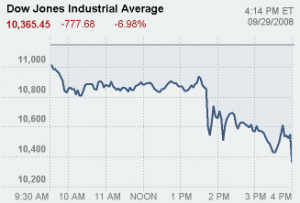Bailout Vote Upends Presidential Campaign
Westminster, Colo. -- Sen. Barack Obama gave another detailed economic address on Monday afternoon, but it was mostly beside the point. He ticked through his
Jul 31, 2020243.2K Shares4.5M Views
Westminster, Colo. — Sen. Barack Obama gave another detailed economic addresson Monday afternoon, but it was mostly beside the point.
He ticked through his principles for a rescue plan — both nominees have shifted their language from “bailout” to “rescue” — and blamed the GOP’s free-market fundamentalism for the current financial crisis.
The 3,000 person crowd cheered wildly, especially when Obama blasted President George W. Bush’s policies. But news of today’s vote had not yet spread through the audience here. Obama’s supporters did not voice any opposition when he touted the rescue plan — though it faces widespread antipathy among the general public.
From the roving bubble of the campaign motorcade, it’s hard to get a full sense of how this news effects the election. Obama has barely shifted his tone here, as I reported earlier, treating a massive setback in Congress as simply a temporal issue.
The markets disagreed with the single largest point drop ever. This looks like a reaction to no deal — not the expectation of a deal on, say, Thursday.
Obama’s aides say they are not changing his schedule in reaction to the news. After Obama’s speech, they released a statement chastising McCain’s “hyper-partisan” reaction to the vote — which blamed Obama and argued he did not put country first.
Instead, Obama’s spokesperson said it was time for the parties to join together to “avoid economic catastrophe.”
The emerging conventional wisdom, at least according to an extremely informal sampling of reporters on the trail, is that this development hurts McCainmore than Obama.
Jay Carney, Time’s Washington bureau chief, writesthat McCain demanded credit if the bill passed after his mythic campaign “suspension” — Bill Kristol was still hyping that credit in his column today — but the flipside is accountability. “Since the legislation failed and the markets are anything but reassured, should we assume the opposite — that McCain will be assigned some of the blame for not bringing along those House Republicans?,” he asked.
Obama’s aides are circulating Carney’s pointed question, along with a similar piece from The Atlantic about “McCain’s Share of the Blame.”
By announcing that his physical presence in Washington was vital for economic recovery, and thus threatening to play hooky from the debate, McCain raised expectations for his role in the bailout process more than his opponents ever could have.
He hitched his political fortunes to a combustible floor fight that failed — at least for now.

Hajra Shannon
Reviewer
Hajra Shannona is a highly experienced journalist with over 9 years of expertise in news writing, investigative reporting, and political analysis.
She holds a Bachelor's degree in Journalism from Columbia University and has contributed to reputable publications focusing on global affairs, human rights, and environmental sustainability.
Hajra's authoritative voice and trustworthy reporting reflect her commitment to delivering insightful news content.
Beyond journalism, she enjoys exploring new cultures through travel and pursuing outdoor photography
Latest Articles
Popular Articles
